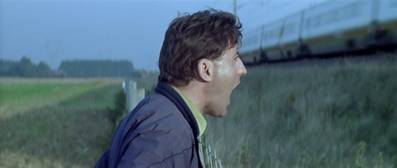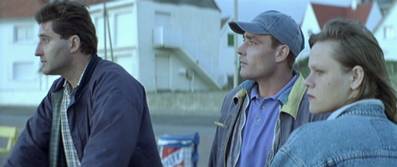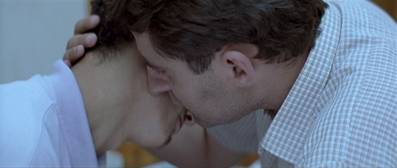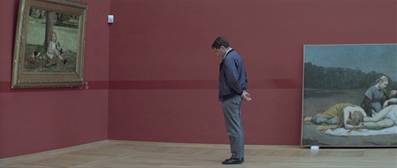|
In
massive wide shot, a man jogs across the horizon line, so
small you barely register his presence at first (at least
on a non-cinema sized screen), and yet his struggled breathing
is loud enough to suggest we are running alongside him and he is panting in our ear. A few moments later, he collapses wide-eyed
in the mud. Is he dead? It appears not. Returning to his car to answer a radio call, he responds by telling whoever
summoned him that he is on his way, then sits and looks mournfully at the landscape for some
time before driving away. By now we have been introduced to what is likely our main character and his unexplained
but obvious weariness with his life and work, the nature
of which has yet to be defined. We don't have to wait long to find out.
Our man is police superintendent Pharaon De Winter, and
he has just been called to the location of a murder of a young girl. Despite
the unpleasant nature of the crime, it is not of prime importance
here. This is not about the murder or the killer or even the investigation, it's about Pharaon De Winter, and
we will be spending a lot of time in his company. Just
occasionally we will get inside his head.
The
next sequence begins in as jarring a manner as you'll see all year, as we are introduced to the crime scene through
a medium close-up of the insect-dotted spread legs and genitals
of the victim, and this is where the audience opinion will start to divide. Moments later we are made aware that we have
been looking at the body of an 11-year-old schoolgirl who
has been brutally raped and killed. De Winter is supremely
uncomfortable with the whole situation. He's not the only
one, but that's clearly the idea. When his neighbour remarks
on hearing about the murder that "life is really sick,"
the film wants us to understand what that means from Pharaon's first-hand
experience rather than via the neighbour's
(and the usual filmgoer's) watered-down view of the
event.

Right
from the start, Pharaon is an enigmatic curiosity. A policeman
of some rank and authority, he nonetheless never seems comfortable
at his workplace, spending much of his time looking around him wide-eyed,
like a lost child. Despite being in he mid-to-late
thirties, he lives with his mother and spends his spare
time loitering on his doorstep, observing passers by with
a mixture of longing and curiosity. He has a schoolboy crush
on the girl next door, Domino, whom he walks in on early in
the story while she is in the throes of energetic sex
with her boyfriend Joseph. Rather that turn and walk out
in embarrassment, he stands in the doorway and watches.
Domino sees him and later reprimands him, but a short while
later apologises for doing so, momentarily thrilling Pharaon, who reacts like a shy, virginal high-school kid who has just landed
his first date. Domino and Joseph regularly invite Pharaon
to join them for dinner or on trips, and he endures Joseph's
occasional piss-taking in the hope of just a look or a smile
from Domino. Domino clearly likes him a lot, but just how
much is uncertain.
The
film spends its first 40 minutes on this three-way relationship
and effectively pushes the murder investigation so far into
the background that it almost vanishes from the story.
By the time it re-emerges we have been supplied, albeit through
an almost throwaway line, with a possible reason for why
Pharaon is how he is. Although this is never explored or
expanded on, it changes the way you read everything he does
from that point on, adding a new layer of meaning to his
attitude to the investigation and to those around him. Pharaon
sees human behaviour as largely animalistic and driven essentially
by base desires and instincts, and has seemingly little
understanding of the complexity of emotions that drive the
actions he observes. Thus when he catches Domino and Joseph
having sex, he watches on not out a voyeuristic curiosity
or pleasure, but with a look of dismay laced with child-like
confusion, that of a boy who has just walked in on his
parents in full flow and cannot comprehend what he is seeing, and when Domino later exposes herself to him in a starkly
direct come-on, he reacts by running away. Like a pubescent
teenager, he desires the idea of the woman, but
is frightened off by the animal act of copulation. It is
suggested that he makes little distinction between the rape
perpetrated on the murdered girl and the sexual act he witnesses
Domino involved in, a connection emphasised by an almost
identically framed (and equally explicit) shot of Domino's
spread legs following his rapid departure, something that
is further clarified by the film's ending.

If
Pharaon seems to shy away from physical contact in his private
life, it nonetheless proves to be a curiously crucial aspect
of his police work. His interrogation method seems to involve
the smelling, caressing and embracing of his suspects, a
technique that has appeared before both in literature (FBI
agent Will Graham in Thomas Harris's Red Dragon)
and in film (Detective Ron Craven in Edge of Darkness),
but here acts almost as a funnel for the emotional and physical
contact that Pharaon keeps otherwise buried. It is only
in his professional role that he makes any sort of physical
connection with Domino – when she and her fellow strikers
besiege the town hall and demand to see the mayor, he casually
pushes her aside in order to stand off against the strike leader,
his facial expression suggesting both the more aggressive policeman
he once was and a previously unimaginable capacity for
violence. It is this element of his personality that he
is unable to summon in his private life, specifically to confront a group of noisy restaurant customers
who attempt to humiliate Domino, a task that falls instead
to the more openly masculine Joseph.
Increasingly,
Pharaon's safety valve begins to falter, and at times he
almost seems to shut down on the spot, his eyes closing
and his empathic powers reaching out to touch anyone in
close proximity, who react in different ways, from backing
off to hugging him. His true state of mind in these moments
remains ambiguous, but occasionally his reactions offer
multiple readings, most notably when he returns to the scene
of the crime and runs screaming across the nearby field,
a cry of despair for brutality of the act, of frustration
at the lack of progress on the case, and of anguish at his
own memories. But it is also a partial re-enactment of the victim's
possible last actions, one that helps to suggest a new
line of investigation. This transports him briefly and unexpectedly
to England, a trip whose most affecting moment comes when
he watches, from the upper floor of a tower block, a man being
violently assaulted in the street. Without doubt his strangest
episode of introspection occurs on his allotment towards the end of the film, when he becomes lost in thought and appears
to float a good foot above the ground, briefly moving the
character and the film into the realms of the metaphysical
and the purely symbolic.

Of
course, none of this counts for squat if you do not connect
with director Bruno Dumont's approach to his subject matter,
and that is where the divisions have really occurred. The
sedate pacing and emphasis on the stillness between conversation
and action are not going to work for everyone. But even
more problematic for some is the casting of non-professionals
in the lead roles, whose performances will be read as emotionally
vacant or thoughtfully understated, depending on your viewpoint.
Certainly the 1999 Cannes Jury headed by David Cronenberg
believed the latter, awarding not only the Jury Prize to
Dumont, but the Best Actor and Actress gongs to Emmanuel
Schotté and (in a tied award with Émilie Dequenne
for the Dardenne Brothers' Rosetta) Séverine
Caneele as Pharaon and Domino respectively, prompting very
vocal jeers from the festival audience and the usual sneering
comments from the American trade press. This same division
was evident when we screened the film for a cinema audience
a few years back, which prompted a very negative reaction from
some but enthusiastic praise from others. Just recently
I read an interesting reaction from a Japanese viewer on
IMDB, who summed up his contradictory feelings by stating that although he hated the film, he also
admired it.
Personally,
I'm with Big Dave and the Cannes jury. I can see why people
would dislike the film or, to a degree, why some would be
offended (though frankly if it's the explicit sex that bothers
you then you need to be offended) or even bored by it. But
every viewing I have had has kept me completely
enthralled. Dumont's pacing, attention to small detail and
use of the scope frame, particularly to isolate characters
within urban or rural landscapes or to suggest tentative
connections between them, is striking throughout, and I
find the performances of the two leads to be both believable
and refreshing in their honesty, and, in Caneele's case,
its unflinching boldness. Individual moments may seem calculated
to court controversy, but all of them have a clear purpose
within the film's structure and fully justify their presence,
to the degree that it simply would not be as effective
without them. For some, L'Humanité
will not prove an easy or even involving experience, but
for those willing to go where Dumont is taking them, it
is a most worthwhile and memorable one.
Framed
2.35:1 and anamorphically enhanced, this is a splendid transfer
that showcases Yves Cape's precise and telling scope compositions
beautifully. Contrast, sharpness and colour are all first
rate, black levels are on the nose and digital noise is
virtually non-existent.

The
sound is Dolby 2.0 stereo only, but is still a quality transfer,
especially in the reproduction of location ambient sound
such as wind and surf, which are key components of certain
scenes and sound as good here as they did in the cinema.
Not
a lot here. The Production Notes
nicely outline the the director's attitude to French cinema
and this film in particular, as well as the controversy
surround its multiple Cannes win.
The
Bruno Dumont Filmography provides
a very brief overview of the director's career to date.
It's
always difficult to recommend a film that you know a fair
proportion of potential viewers are going to really take
a dislike to, but I do so nonetheless. For me, L'Humanité
is a bold and intelligent experiment in low-key but detailed
character study that is at its most keenly observational
not through its dialogue exchanges, but in the quietest moments that
lie between them. The DVD has been a while coming, but has proved
worth the wait for the fine transfer, though it does lose
out a little on the extra features, which should take you
no more than two minutes to trawl through. Otherwise, a very welcome
release of a film that will continue to split opinion, and
long may it do so.
|